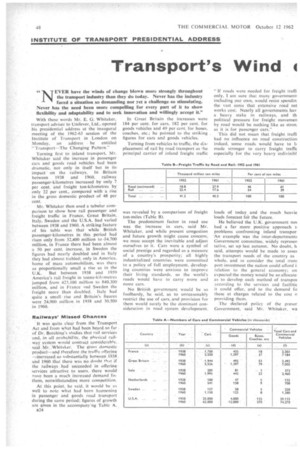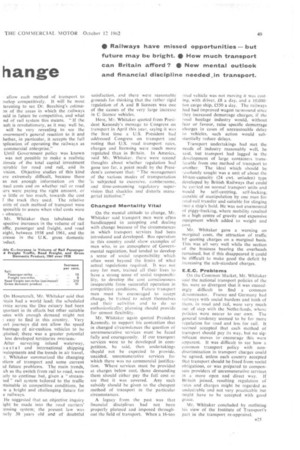Transport's Wind 4
Page 50

Page 51

If you've noticed an error in this article please click here to report it so we can fix it.
hange
EVER have the winds of change blown more strongly throughout the transport industry than they do today. Never has the industry faced a situation so demanding nor yet a challenge so stimulating.
Never has the need been more compelling for every part of it to show flexibility and adaptability and to seek innovation and willingly accept it."
With these words Mr. E. G. Whitaker, transport adviser to Unilever, Ltd., opened his presidential address at the inaugural meeting of the 1962-63 session of the Institute of Transport in London on Monday, an address he entitled " Transport—The Changing Pattern."
Turning firstto inland transport, MT. Whitaker said the increase in passenger cars and goods road vehicles had been dramatic, not only in itself but in its impact on the railways. In Britain between 1938 and 1960. railway passenger-kilometres increased by only 7 per cent, and freight ton-kilometres by only 22 per cent., compared with •a rise in the gross domestic product of 48 per
cent. . .
• Mr. Whitaker then used a tabular comparison to show hOw rail passenger arid freight traffic in France, Great Britain, Italy, Sweden andthe U.S.A. had varied between 1938 and 1960.A striking-feature of his table was that while British passenger-kilometres in this period had risen only from 32,400 million to .34,700 million, in France there had been almost a 50 per cent. increase, in Sweden the figures had nearly doubled and in Italy they had almost trebled; only in America. home of mass automobilism, was there as proportionally small a rise as in the U.K. But between 1938 and 1959 America's rail freight in tonne-kilemetres jumped from 423.100 million to 840.300 million, and in France and Sweden the freight more than doubled. Italy had quite a small rise and Britain's figures were 24,900 million in 1938 and 30.500 in 1960.
Railways' Missed Chances
It was quite clear from the .Transport Act and from what had, been heard so far of Dr. Beechine's studies that rail Services and, in all probability, the physical railway system would contract considerably. said IVIr. 'Whitaker. The gross domestic product—and therefore the traffic offering —increased so substantially between 1938 and 1960 that there was no doubt +hat if the railways had succeeded in offering services attractive to users, there would nave been a much increased demand fol them, notwithstanding more competition.
At this point, he said, it would be as well to note what had been hanoening in passenger and goods road transport during the same period; figures of growth are given in the accompanyng Table A.
B24
In Great Britain the increases were 184 per cent. for cars, 182 per cent. for goods vehicles and 49 per cent, for buses, coaches, etc.; he pointed to the striking figures for cars and goods vehicles.
Turning from vehicles to traffic, the d:splacement of rail by road transport as the principal carrier of inland freight traffic
was revealed by a comparison of freight ton-Miles (Table B).
The predominant factor in road use was the increase in cars, said Mr. Whitaker, and while present congestion and future growth might cause concern; we must accept the inevitable and adjust ourselves to it. Cars were a symbol of social prestige and regarded as a measure of a country's prosperity; all highly industrialized countries were committed to a policy of full employment, developing countries were anxious to improve their living standards, so the world's roads would have to carry more and More ears.
No British government would be so focilhardy, he said, as to unreasonably restrict the use of cars, and provision for them would surely be the dominant consideration in road system development. "If roads were needed for freight traffi only, I am sure that many government! including our own, would resist spendin the vast sums that extensive road net works cost. Nearly all governments hay a heavy stake in railways, and th political pressure for freight movemen by road would be nothing like as stron as it is for passenger cars."
This did not mean that freight.trafli had no influence on road construction indeed, some roads would have to b made stronger to carry freight trafffi especially for the very heavy indivisibl
loads of today and the much heavie loads forecast for the future.
He believed the U.K. government noi had a far more positive approach t problems confronting inland transpor An example was the inter-departments Government committee, widely represer talive, set up last autumn. No doubt, h said, attempts would be made to asses the transport needs of the country as whole, and to consider the total tram port investment the nation could afford i relation to the general economy; on expected the money would be so allocate as to develop each method of transpoi according to the services and facilitie it could offer, and to the demand to these at charges related to the cost c providing them.
The declared policy of the preser Government, said Mr. Whitaker, wa allow each method of transport to :velop competitively. It will be most teresting to sec Dr. Beeching's estimam of the areas in which the railways )uld in future be competitive, and what nd of rail system this means. " If the suit is revolutionary, as it may well be, will be very revealing to see the overnment's general reaction to it and hether, in particular, it accepts the full mlication of operating the railways as commercial enterprise."
Until Government policy was known was not possible to make a realistic timate of the total capital investment :sirable for road and rail, and its vision. Objective studies of this kind ere extremely difficult, because there as not enough information on the :tual costs and on whether rail or road ;ers were paying the right amount, or ,o little or too much, towards the cost f the track they used. The relative crits of each method of transport were 'possible to assess when vital costs were I obscure.
Mr. Whitaker then tabulated the spective increases in the volume of rail affic, passenger and freight, and road eight, between 1938 and 1961, and the crease in the U.K. gross domestic .oduct.
On Hovercraft, Mr. Whitaker said that ,itain had a world lead; the scheduled rvice across the Dee estuary had been mortant in its effects but other suitable lutes with enough demand might not
easy to find in this country. Very ort journeys did not allow the speed !vantage of air-cushion vehicles to be :ploited; there was a greater potential less developed territories overseas: After surveying inland waterway, 3as tal and international shipping :velopments and the trends in air travel, r. Whitaker summarized the changing Merl" of transport and some current id future problems. The main trends, .ch as the switch from rail to road, were zely to continue but, given a " streamled " rail system tailored to the traffic Aainable in competitive conditions, he w a bright and challenging future for e railways.
He suggested that an objective inquiry ight be made into the road carriers' :ensing system; the present law was :arly 30 years old and of doubtful satisfaction, and there were reasonable grounds for thinking that the rather rigid regulation of A and B licences was one of the causes of the very large increase in C licence vehicles.
Here, Mr. Whitaker quoted from President Kennedy's message to Congress on transport in April this year, saying it was the first time a U.S. President had addressed Congress on transport and noting that U.S. road transport rates, charges and licensing were much more regulated than in Britain. In America. said Mr. Whitaker. there were second thoughts about whether regulation had gone too far, a point made by the President's comment that: "The management of the various modes of transportation 'is subjected to excessive, cumbersome, and time-consuming regulatory supervision that shackles and distorts managerial initiative."
Changed Mentality Vital On the mental attitude to change, Mr. Whitaker said transport men were often handicapped in accepting and dealing with change because of the circumstances in which transport services had been introduced and developed. Bus operation in this country could show examples of men who, in an atmosphere of Governmental regulation, had tended to develop a sense of social responsibility which often went beyond the limits of what actual regulations required. It was not easy for men, trained all their lives to have a strong sense of social responsibility, to develop the cost consciousness inseparable from successftil operation in competitive conditions. Future transport men must be encouraged to accept change, be trained to adapt themselves and their activities and to do so enthusiastically; planning should provide for utmost flexibility.
Mr. Whitaker again quoted President Kennedy, to support his contention that in changed circumstances the question of unremunerative services must be faced fully and courageously. If our transport services were to be developed in competition, he said, then undertakings sheuld not be expected to provide, unaided, unrcmunerative services for which there was no commercial justification. Where services must be provided at charges below cost, those demanding them should either pay the full cost or see that it was covered. Any such subsidy should be given to the cheapest method of transport in the particular circumstances.
A legacy from the past was that financial disciplines had not been properly planned and imposed throughout the field of transport. When a 16-ton
road vehicle was not moving it was costing, with driver, £8 a day, and a 10,000ton cargo ship, £550 a day. The railways had had improved wagon turnround since they increased demurrage charges; if the road haulage industry would, without fear or favour, raise specific demurrage charges in cases of unreasonable delay to vehicles, such action would substantially reduce delays.
Transport undertakings had met the needs of industry reasonably well, he said, but transport had lagged in the development of large containers transferable from one method of transport to another. The ideal which should be resolutely sought was a unit of about the 10-ton-capacity (24 cwt. unladen) type developed by British Railways that could be carried on normal transport units and would be self-centring, self-locking, capable of manipulation by one man for road-rail transfer and suitable for slinging into a ship's hold. He was not enamoured of piggy-backing, where mobility resulted in a high centre of gravity and expensive equipment which added to weight and cost.
Mr. Whitaker gave a warning on marginal costs, the attraction of traffic b7 quoting charges on a marginal basis. This was all very well while the section of the business bearing the overheads remained, but if this disappeared it could be difficult to make good the deficit by increasing the sub-standard charges.
E.E.C. Problems On the Common Market, Mr. Whitaker said the national transport policies of the Six were so divergent that it was exceedingly difficult to find a common denominator. France and Germany had railways with social burdens and both of them, in road and rail, were very much out of step with the Netherlands, whose policies were nearer to our own. The general tendency seemed to be for more regulation for road and less for rail. It seemed accepted that each method of transport should pay its way, but no significant moves toencourage this were apparent. It was difficult to see how a common transport policy with nondiscrimination in transport charges could be agreed, unless each country accepted that transport should be freed from social obligations, or was prepared to compensate providers of unremunerativc services in a more open and direct way. If Britain joined, resulting regulation of rates and charges might be regarded as undesirable and not very practicable but might have to be accepted with good grace.
Mr. Whitaker concluded by outlining his view of the Institute of Transport's part in the transport re-appraisal.




















































































































